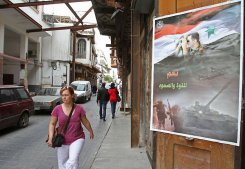 |
| © AFP Anwar Amro |
WASHINGTON (AFP) – Although the Assad regime in Syria has long been a thorn in Washington’s side, the Obama administration is not yet ready to throw its lot in with anti-government protesters there, analysts said.
The unrest gripping Syria comes as President Barack Obama pursues a new US policy of engaging with a former foe in a bid to promote a broader Arab-Israeli peace by driving a wedge between Syria and its ally Iran.
His administration may be hedging its bets because it will still have to deal with the regime if President Bashar al-Assad and his powerful security forces end up crushing the unrest.
Ammar Abdulhamid, a Washington-based Syrian dissident and democracy activist who has political contacts in Washington, said some US officials fear a change and prefer to work with Assad, at least for now.
“I think they will get there (to accept a change) in due course of time,” Abdulhamid told AFP.
“But for now… they are afraid that… Assad will not go out gently into that good night and therefore they might try to create trouble, and that will create a civil war type scenario.”
They fear it “will be either civil war or they will have to deal with an even more radicalized and anti-Western regime if the Assads came up in control again,” said Abdulhamid, who heads the Washington-based Tharwa Foundation.
However, the dissident said, such fears are misplaced because the Damascus regime can hardly become more radical than it is with its close ties to Iran and its support for anti-Israeli Hezbollah and Hamas.
Abdulhamid nonetheless welcomed the Obama administration’s decision to avoid showing undue fear that Islamists would emerge from the protest movement and assume power in Syria.
But Middle East analyst Marina Ottaway said such a threat may exist even though the Muslim Brotherhood was crushed after it was massacred in Hama in 1982 on the orders of Bashar’s ruthless father Hafez al-Assad.
“Has it gone underground, how quickly can it be revived, how much sympathy is there still for the Muslim Brotherhood? I have no idea and I don’t think anybody else has an idea on that,” she said.
The Obama administration is struggling to come up with a policy “case by case, country by country,” said Ottaway, who heads the Middle East program at the Carnegie Endowment for International Peace.
“You cannot say that because the US in the end decided against (former Egyptian president Hosni) Mubarak and (went) on the side of the protesters in Egypt, that it’s going to do the same thing in Syria,” she said.
Ottaway said US officials have more difficulty understanding the protesters and their movement in Syria because there has been a “greater void of political activity” and deeper repression there than in a country like Egypt.
The protests pose a problem for the Obama administration — which she noted is trying to improve ties with Syria to advance US policy — as it will have to assess whether the protest movement will succeed or be crushed.
“If this is something the Syrian government is going to repress quickly, then a policy of trying to find a way to work with the Syrian regime makes sense,” Ottaway said.
“If the protest (movement) is going to continue, and has real potential of bringing about change, then the US had better learn to work with the protesters.”
A senior European diplomat based in Washington said Western powers were concerned about what may replace the Assad regime.
“More than in Libya, you have some extremist networks, connections with Iran, Hezbollah,” the diplomat told reporters on the customary condition of anonymity.
“If it is to have Assad out and a pro-Iranian regime in, that would not be the goal. It’s not an easy task to do for us. On the future of Syria, we are close to our American friends.”
© AFP — Published at Activist Post with license
linkwithin_text=’Related Articles:’


Be the first to comment on "US hedges its bets on Syria: analysts"